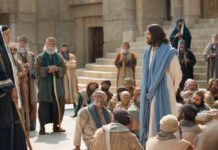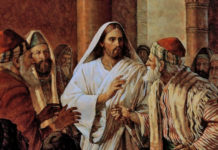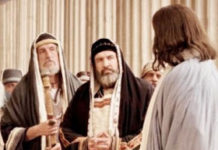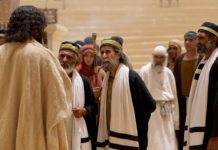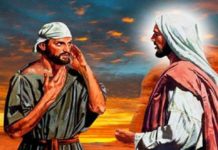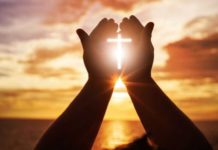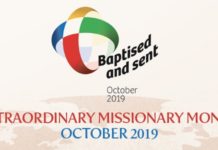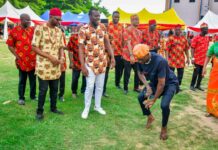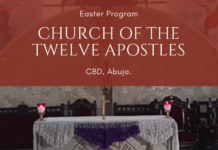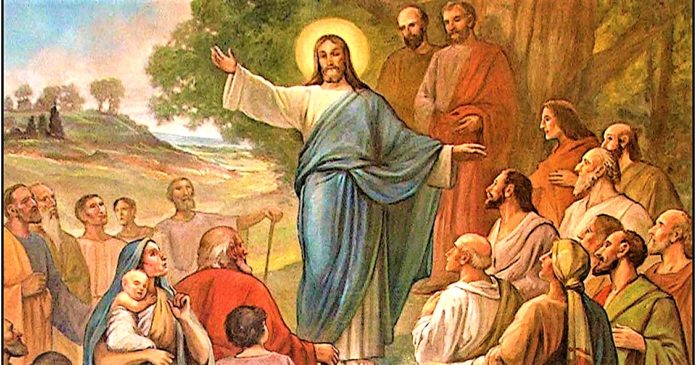FIRST READING
“He brought out bread and wine. ”
A reading from the Book of Genesis (Genesis 14:18-20)
In those days: Melchizedek king of Salem brought out bread and wine; he was priest of God Most High. And he blessed Abram and said, “Blessed be Abram by God Most High, maker of heaven and earth; and blessed be God Most High, who has delivered your enemies into your hand!” And Abram gave him a tenth of everything.
The word of the Lord
RESPONSORIAL PSALM Psalm 110: 1.2.3.4 (R. 4cd)
R/. You are a priest forever, in the line of Melchizedek.
The Lord’s revelation to my lord:
“Sit at my right hand,
until I make your foes your footstool.” R/.
The Lord will send from Sion
your sceptre of power:
rule in the midst of your foes. R/.
R/. You are a priest forever, in the line of Melchizedek.
With you is princely rule
on the day of your power.
In holy splendour, from the womb before the dawn,
I have begotten you. R/.
The Lord has sworn an oath he will not change:
“You are a priest forever,
in the line of Melchizedek.” R/.
SECOND READING
As often as you eat this bread and drink the chalice, you proclaim the Lord’s death. ”
A reading from the first Letter of Saint Paul to the Corinthians (1 Corinthians 11:23-26)
Brethren: I received from the Lord what I also delivered to you, that the Lord Jesus on the night when he was betrayed took bread, and when he had given thanks, he broke it, and said, “This is my body which is for you. Do this in remembrance of me.” In the same way also the chalice, after supper, saying, “This chalice is the new covenant in my blood. Do this, as often as you drink it, in remembrance of me.” For as often as you eat this bread and drink the chalice, you proclaim the Lord’s death until he comes.
The word of the Lord
ALLELUIA John 6:51
Alleluia. I am the living bread which came down from heaven, says the Lord; if any one eats this bread he will live for ever. Alleluia.
Optional Sequence: LAUDA SION
Zion, praise your Saviour.
Praise your leader and shepherd in hymns and canticles.
Praise him as much as you can, for he is beyond all praising
and you will never be able to praise him as he merits.
But today a theme worthy of particular praise
is put before us — the living and life- giving bread
that, without any doubt,
was given to the Twelve at table during the holy supper.
Therefore let our praise be full and resounding
and our soul’s rejoicing full of delight and beauty,
for this is the festival day
to commemorate the first institution of this table.
At this table of the new King,
the new law’s new Pasch puts an end to the old Pasch.
The new displaces the old, reality the shadow and light the darkness.
Christ wanted what he did at the supper
to be repeated in his memory.
And so we, in accordance with his holy directions
consecrate bread and wine to be salvation’s Victim.
Christ’s followers know by faith that bread is changed into his flesh and wine into his blood.
Man cannot understand this, cannot perceive it;
but a lively faith affirms that the change,
which is outside the natural course of things, takes place.
Under the different species,
which are now signs only and not their own reality,
there lie hid wonderful realities. His body is our food, his blood our
And yet Christ remains entire under each species.
The communicant receives the complete Christ —
uncut, unbroken and undivided.
Whether one receive or a thousand,
the one receives as much as the thousand.
Nor is Christ diminished by being received.
The good and the wicked alike receive him,
but with the unlike destiny of life or death.
To the wicked it is death, but life to the good.
See how different is the result,
though each receives the same.
Last of all, if the sacrament is broken, have no doubt.
Remember there is as much in a fragment as in an unbroken host.
There is no division of the reality, but only a breaking of the sign;
nor does the breaking diminish the condition or size
of the One hidden under the sign.
Behold, the bread of angels is become the pilgrim’s food;
truly it is bread for the sons, and is not to be cast to dogs.
It was prefigured in type
when Isaac was brought as an offering, when a lamb was appointed for the Pasch
and when manna was given to the Jews of old.
Jesus, good shepherd and true bread, have mercy on us; feed us and guard us.
Grant that we find happiness in the land of the living.
You know all things, can do all things, and feed us here on earth.
Make us your guests in heaven,
co-heirs with you and companions of heaven’s citizens.
Amen. Alleluia.
GOSPEL
“All ate and were satisfied. ”
A reading from the holy Gospel according to Luke (Luke 9:11b-17)
At that times: Jesus spoke to the crowds of the kingdom of God, and cured those who had need of healing. Now the day began to wear away; and the Twelve came and said to him, “Send the crowd away, to go into the villages and country round about, to lodge and get provisions; for we are here in a lonely place.” But he said to them, “You give them something to eat.” They said, “We have no more than five loaves and two fish — unless we are to go and buy food for all these people.” For there were about five thousand men. And he said to his disciples, “Make them sit down in companies, about fifty each.” And they did so, and made them all sit down. And taking the five loaves and the two fish he looked up to heaven, and blessed and broke them, and gave them to the disciples to set before the crowd. And all ate and were satisfied. And they took up what was left over, twelve baskets of broken pieces.
The Gospel of the Lord.
TODAY’S REFLECTION
As we celebrate the solemnity of the Body and Blood of Christ, the readings invite us to reflect on the meaning of the Eucharist. The Eucharist symbolizes and actualizes the new Covenant established by Jesus through his redeeming sacrifice on the cross.
In today’s Gospel, Jesus satisfies the spiritual yearning of the crowd that gathers to listen to his teachings; but he also commands the twelve to give them food. They bring to him a small offering of five loaves and two fish, which Jesus blesses and multiples to feed the hungry multitude.
We who receive the Body and Blood of Christ partake of the eternal life he has gained for us. At the same time, participating in the Eucharist implies that we need to make an effort to become like Jesus Himself. Like the apostles, we place our simple gifts in his hands; through his grace, he will enable us to do much good, more than we could ever imagine.
